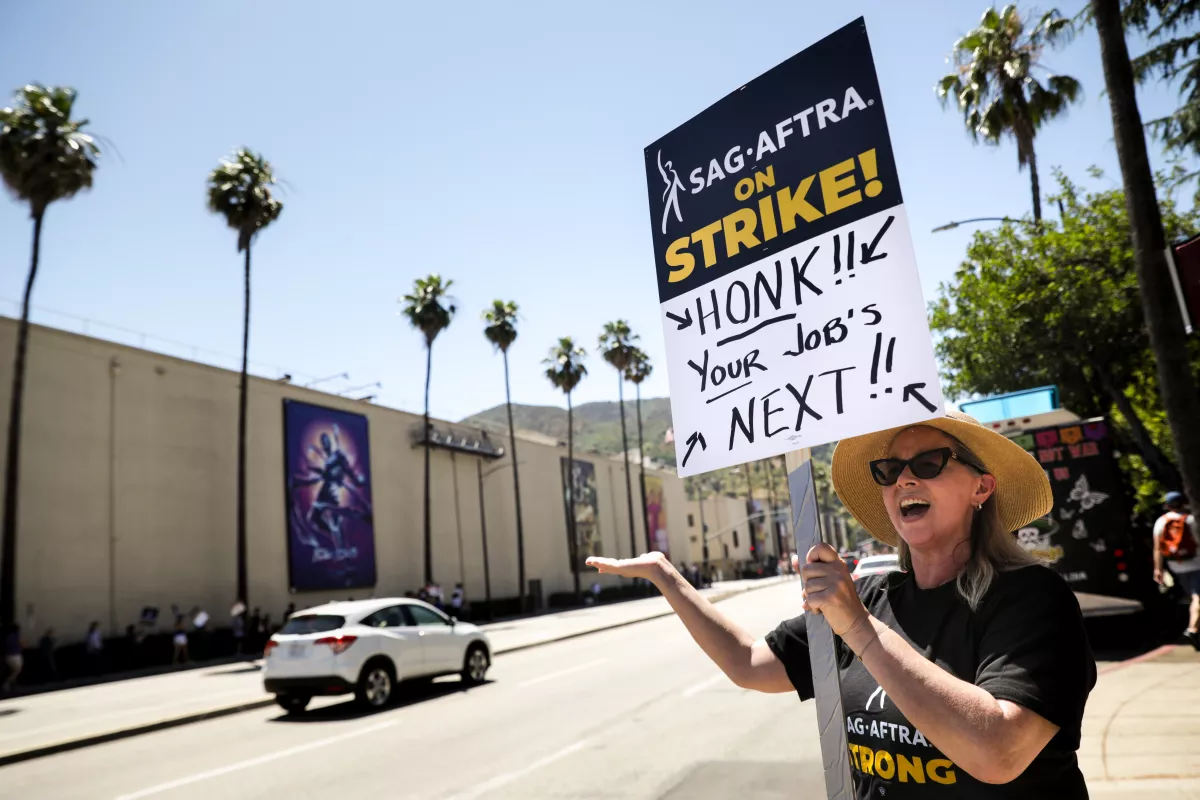The entertainment industry is so upset about artificial intelligence's possible effect on their industry that they have gone on a massive strike.
With Hollywood’s actors and writers currently striking in part over concerns about AI, what was once a movie premise now has come to define the film industry.
Hollywood actors and writers are not the only people expressing concern over the impact of AI.
What about AI and Christianity?
Be informed, not misled.
The Los Angeles Times says, "With Hollywood’s actors and writers currently striking in part over concerns about AI, what was once a movie premise now has come to define the film industry."
"But automation isn’t just a showbiz concern, new polling for the Los Angeles Times shows."
The Times says, "Nearly half of Americans — 45% of them — are concerned about the effect artificial intelligence will have on their own line of work, compared to 29% who are not concerned, according to a new poll for The Times conducted by Leger, a Canadian-based polling firm with experience in U.S. surveys."
The paper says there are other issues, "But AI has been a prominent sticking point, with writers demanding limits on machine-generated scripts while actors push for regulations on the use of cutting-edge technologies to digitally 'clone' them — enabling studios to create new performances without actually needing an actor on set."
AI has already become a "big business."
The Times reports, "A torrent of money is flowing into the sector — $22.7 billion was invested over the first quarter of this year, according to the market research firm PitchBook — and consumer-friendly AI modules such as ChatGPT and DALL-E have rapidly found a mainstream following."
"Industries as varied as law, trucking, retail, policing and journalism are all staring down the barrel of an artificially intelligent future."
The Times says, "Even if these two strikes do change how the entertainment industry uses artificial intelligence, legions of Americans in other professions are anxious about AI — and after Hollywood, they may turn their focus to Capitol Hill."
A lot of people believe they are "staring down the barrel."
In a news conference last month, the president of SAG-AFTRA, Fran Drescher, stated that “artificial intelligence poses an existential threat to creative professions, and all actors and performers deserve contract language that protects them from having their identity and talent exploited without consent and pay.”
“If we don’t stand tall right now, we are all going to be in trouble. We are all going to be in jeopardy of being replaced by machines,” Drescher added.
“This is not just a Hollywood phenomenon,” said Greg Cross, chief executive of the AI avatar startup Soul Machines. “AI is literally eating the world.”
Christianity and AI
Almost half of Americans, and 57% of those aged 18 to 34, are concerned about the impact of artificial intelligence (AI) on their jobs.
Almost Half of Americans Are Worried AI Will Affect Their Job:
— Farhan (@mhdfaran) August 7, 2023
Almost half of Americans, and 57% of those aged 18 to 34, are concerned about the impact of artificial intelligence (AI) on their jobs.
According to a poll by the Los Angeles Times.
The poll surveyed 1,002 adult… pic.twitter.com/TeFVyLEoPd
AI is a type of technology, and technologies can be used either for good or bad purposes. Understood from this “dual use” perspective, AI is morally neutral. The consequences of the deployment of technologies, however, are not always evenly divided among good and bad outcomes. The way technologies are designed can constrain human choices, promote specific habits of use or, in some cases, introduce potential harms that are disproportionate in magnitude or duration in comparison to the beneficial effects. For a very powerful or potentially irreversible technology, all of these aspects must be considered in the ethical analysis guiding decisions about appropriate use or restraint.The Christian understanding of human nature also encompasses a dual aspect. All human beings are created in the image of God and are designed by their Creator to have inestimable worth (Genesis 1:25-26). At the same time, all human beings are fallen. Human nature is both splendid and sinful. Scripture encourages us to seek righteousness (Matthew 6:33) while also reminding us that all have sinned and fallen short of the glory of God (Romans 3:23).
AI machines are not human. This means that for AI operations, moral responsibility is ambiguous. When the AI diagnoses cancer, it may be unclear whether or to what degree the physician operating the device deserves credit. When the AI commits a medical error, it may be impossible to determine where the blame is due. Was the missed cancer the fault of the physician, the AI manufacturer, the AI programmer, or the AI itself? Can a machine apologize and mean it? A machine might be programmed to mimic the expression of remorse, but can it feel genuine remorse? Can it truly care about the patient?
The consistent witness of Christianity is that human beings possess unique dignity as image-bearers of the Creator and that Jesus Christ, the one and only Son of God, took on humanity (Philippians 2:5-7). This human dignity Christ affirmed in the Incarnation can only be seen as an obstacle to utopic projects seeking to replace human intelligence with a grand machine intelligence. The Christian, by contrast, humbly submits to the will of a loving God by seeking to have an attitude of mind like that of Christ (Romans 12:2, 1 Corinthians 2:16).
Takeaway
The Christian perspective maintains that a strictly materialistic account of human intelligence needs to be revised.
We will continue to follow the development of AI and how it impacts Christians and the spreading of the Gospel.
Be Informed. Be Discerning. Be Vigilant. Be Engaged. Be Prayerful.


